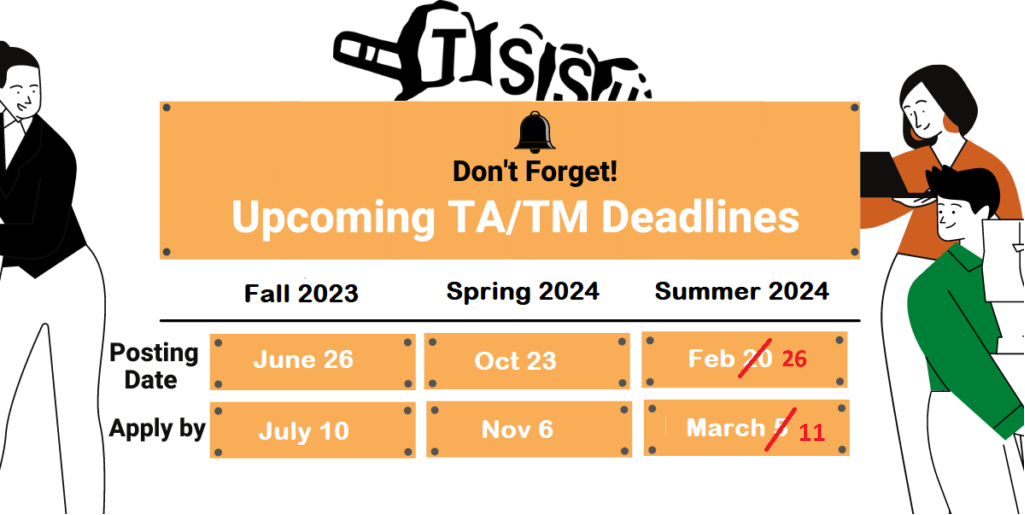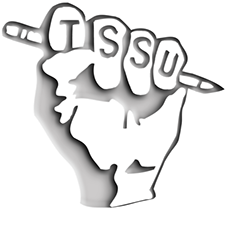
Upcoming TA/TM Posting Dates: Fall 2023 jobs posted June 26, 2023 apply by July 10, 2023. Spring 2024 jobs posted October 23, 2023 apply by Nov 6, 2023. Summer 2024 Jobs posted Feb 26, 2024 apply by March 11, 2024. If you have questions email tssu@tssu.ca
What is a Teaching Assistant or Tutor Marker at SFU?
Teaching Assistants (TAs) do a variety of tasks, from marking assignments to running tutorials and labs. The job is designed as graduate student support and plays a key role in SFU's educational model. Many lower-division classes have hundreds of students, so a TA running a tutorial, rather than the professor, is the primary point of contact with the students outside of class.
In addition, some TAs are now assigned duties for Distance Education Courses, where interaction with students happens by email or through Canvas. Many of these courses were previously run by Tutor Markers (TMs) and as a result of the 2023 strike still have compensation directly related to the number of students assigned.
Finding upcoming jobs:
All positions for TAs are posted on the Monday of the tenth week prior to the start of the semester. Postings are found on the Centralized Job Posting Website, as well as on departmental websites. Only those positions which must be re-posted will appear after the start of the posting period.
How long are postings available?
All positions are posted for two weeks (exception: some re-posted positions when there is insufficient time for a two-week posting period). If a position in your department has to be re-posted, you will be sent an email advising you of the re-posting.
How do I apply?
In your department
If you are applying for a position in your own department, you submit one application in which you list your preferences for particular positions. You will be considered for all available positions. Your application should explain the knowledge you have which would be sufficient to interpret the course material for students.
In other departments
To be considered for a particular position you must have applied for that position.
How do departments determine successful applicants?
The Collective Agreement sets out the priority for accessing work in Article 13, Section F. Here is the order of priority for that work:
- Graduate students registered in the department
- Graduate students registered in other departments
- Undergraduate Teaching Assistants (UTAs)
- External Teaching Assistants (ETAs)
The priority is fulfilled if you are awarded five base units (or fewer if requested). If you do not receive five base units prior to positions being re-posted, then you will have priority for the re-posted positions but you do need to apply for them.
Inside each priority group, how do they determine who gets what course?
The department has to make all reasonable efforts to apply candidates' stated preferences. In addition, the department must publish a priority system explaining how they will choose among applicants within a priority group when there are insufficient positions available.
How can we be sure that this system is properly applied?
TSSU can ask the department for a spreadsheet detailing the applicants and the positions awarded. If the spreadsheet reveals that the department has not followed the rules, we can file a grievance. If you think that this may be happening in a department, please contact tssu@tssu.ca. Please note that your name does not have to be connected to any grievance that may arise.
Who can be a TA?
The jobs are posted publicly, but because they've been designed as graduate student support, graduate students get priority access for jobs. Currently, about 80% of TA jobs go to graduate students, while the remaining 20% of jobs go to undergraduate students and other applicants.
How many hours does a TA/TM work?
The pay for TAs is a salary system with a maximum number of hours of work per "base unit" (BU). One BU corresponds to a maximum of 42 hours of work over a semester, including holiday time. Since workload fluctuates during the semester, a good rule of thumb is to expect a range of 2-5 hours of work per week per BU. All TAs should track their hours, as any work over the salaried amount must be compensated by the department. TSSU has logbooks that can be used to keep track of hours worked throughout the semester.
Why should I be a TA as a graduate student?
Being a TA is one of the primary sources of income for most SFU graduate students. TA jobs can vary from three to 20 hours per week and are paid on a salaried basis with some significant benefits.
All TAs are paid a wage around $26 an hour, which includes 4% vacation pay. In addition TAs/TMs who are Master's students (GTA1) receive a scholarship top up, while TAs who are PhD students (GTA2) receive a scholarship top-up that is almost 2.5 x what Master's students receive.
| Category | Description | Salary per BU | Scholarship per BU* | Total per BU | Max hours per BU** |
| GTA1/GTM1 | Master's student TA/TM | $1,094 | $154 | $1,248 | 42 |
| GTA2/GTM2 | PhD student TA/TM | $1,094 | $384 | $1,478 | 42 |
| ETA/ETM or UTA/UTM | External or Undergraduate TA/TM | $1,094 | $0 | $1,094 | 42 |
**one BU comprises a maximum 42 hours of work (less 1.1 hours, of which are set aside for statutory holiday compensation)
In addition to the salary, international students will get about $300 per semester in savings, as BC Medical Services Plan premiums are paid by the Employer when you TA and a substantial reimbursement for the cost of Guard.me medical insurance. TAs also have the right to defer tuition, paying a small amount from each paycheque throughout the semester rather than the entire tuition amount at the beginning of the semester.
My department has very few jobs -- can I still be a TA?
In the strike of 2012, TSSU members won the right for graduate students to have priority in departments other than their own. Within your own department you have the highest priority, and in other departments you have the second highest priority. A graduate student may be qualified to teach in many other departments: for example, an Engineering graduate student may be qualified to be a TA in Physics, Chemistry, Math, and Engineering; A Sociology graduate student may be qualified to be a TA in English, History, Labour Studies, and Sociology.
Do I need to be a subject expert to be a TA/TM?
No, as a TA your job is to help relay and interpret the course material for the students in the class. Having a general background in the discipline, or related discipline, is often sufficient to be very successful as a TA. Many TA jobs include time to attend lecture as part of the duties. In addition, if there is course specific software or technology then training time must be included within the appointment. In other words you don't need to be an expert in the specific software either, just be able to pick up how to use it in a reasonable amount of time.
I'm in a course-based program like M.Eng, M.Sc. Finance, M.B.A, etc. -- can I still be a TA/TM?
Yes -- graduate students have priority regardless of the type of program in which they're registered. Graduate students from applied programs, like those listed above, have a lot to bring to a classroom and should be valued members of the teaching staff at SFU.
What if my department says we shouldn't be a TA?
While there might be good reasons to listen to your department, some departments may try to convince you that you shouldn't be a TA in order to save money. If enough graduate students don't apply, then the department can hire external or undergraduate TAs for cheaper. If your department advises you not to apply for a TA position, be aware that they may have a conflict of interest in the matter.
If you have any questions, or run into issues getting a job as a TA/TM, you can always contact TSSU.
